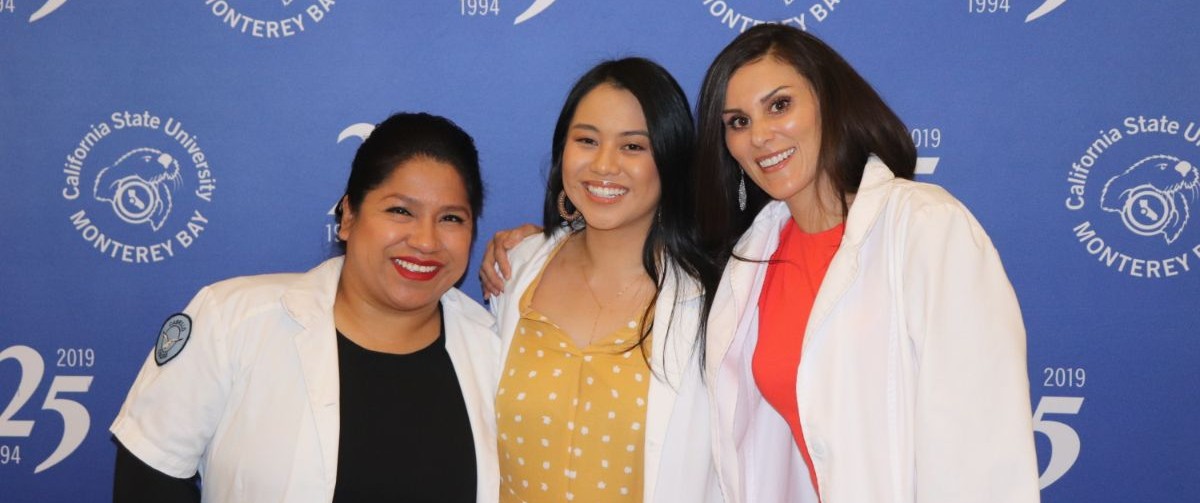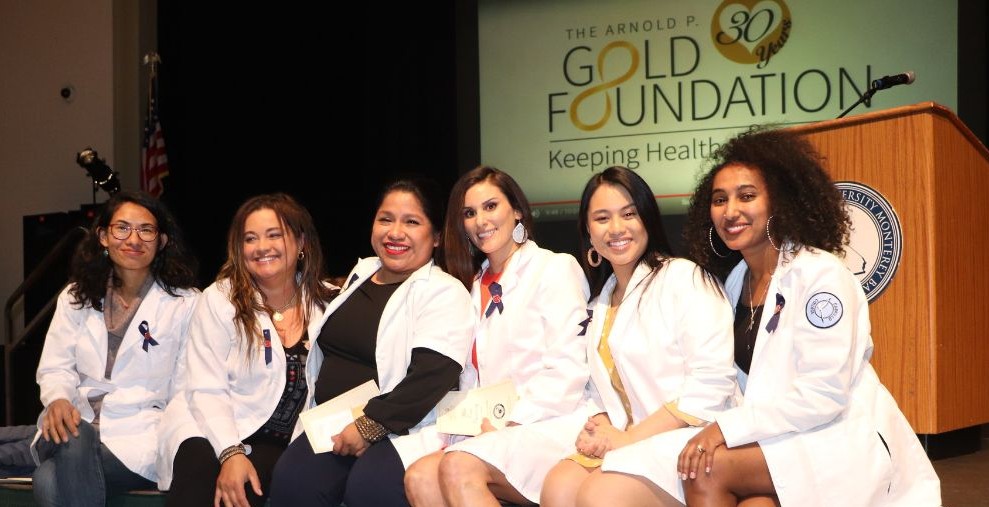Program overview
California State University, Monterey Bay offers two pathways for students to earn their Bachelor of Science in Nursing (BSN). All entering students must be graduates of an Associates Degree in Nursing program (ADN) or hold a current California Registered Nursing license (or will earn a California Registered Nursing license prior to last semester in the program).
Courses are offered through Extended Education as "hybrid" courses, a blend of on-line and face-to-face courses that maximizes access opportunities for students. Courses are typically scheduled all on the same day to accommodate students' schedules. The BSN degree can be obtained in 3 semesters for full-time and 5 semesters for part-time depending on the pathway.

Mission
The CSUMB Department of Nursing is a community focused, student-centered program whose mission is to educate nurses for professional practice in diverse healthcare settings that is influenced by global health.
Vision
The CSUMB Nursing Program's vision is to educate nurse professionals to be change agents in the science of nursing.
Our Philosophy on nursing
The faculty at the Department of Nursing, California State University, Monterey Bay view that the Bachelor of Science in Nursing (BSN) undergraduate education should embody a broad background in the sciences, community service, global health, and liberal arts studies. The nursing discipline-specific courses are developed to prepare graduates to assess, plan, implement and evaluate care, based on current evidence in a variety of nursing practice settings and specialties.
The Department of Nursing academic programs are deliberately designed in response to surrounding community needs, larger societal needs including but not limited to the need for greater access to equitable healthcare, the role of technology and healthcare structuring systems in healthcare and population health education, surrounding self-care responsibility. The faculty affirms that the professional baccalaureate level graduates are prepared as generalists who provide healthcare as clinicians, clinical nurse researchers, patient educators, and leaders in the practice setting.
BSN graduates are catalysts or change agents in the community/public health settings where they practice as independent and critical thinkers, while advocating for the client/patient/family and the nursing profession. This ideology supports the most fundamental philosophy of faculty, that nursing science and art collectively utilizes the principles of connectedness of patient/client as individual, family or community. This ideology supports the vision/mission of the university and the college as well as the commonly held beliefs of the faculty.
These beliefs reflect the faculty’s attitudes about the personhood, health and well-being, nursing science, environment and teaching-learning as it impacts the community. The faculty’s approach to nursing education is that students are future nursing professionals and are adult learners with a commitment to continuing education who are going to provide healthcare that will improve the health and well-being of individuals, families and communities.
The faculty collectively support and foster the diversity of students’ backgrounds and their personal beliefs and experiences they bring to nursing inquiry. This philosophy of nursing espouses that making a professional nursing career choice may have its challenges, but the faculty are prepared to respect the student’s choice and foster them with integrity, respect for self and others, the need for collegiality and partnerships, teaching/learning skills, social justice, and an awareness of community needs.

Program goals
- Prepare students to read critically, write cogently, think broadly and challenge assumptions
- Serve as collaborative, empathetic leaders to develop culturally responsive environments that foster well-being in local and global communities
- Promote academic excellence to support life-long professional growth
- Advocate for inclusion and social equity across all settings
- Practice professionally from an integration of knowledge, skills and abilities
Major Learning Outcomes (MLOs)
MLO 1: Communication
1. Develop effective leadership and management skills within the standards of nursing practice to improve patient safety and improve health outcomes for populations across the lifespan
2. Practice collaboratively through integrity, dignity, collegiality and professionalism within an interdisciplinary team
3. Apply culturally and linguistically responsive communication strategies with populations, communities, families, and individuals while attending to ethical standards and professional values
MLO 2: Population health
4. Articulate how health policies are processed and how it informs the nursing profession and the population
5. Advocate for a health-equity based assessment of a community's health status data, including health determinants, assets, barriers, and inequities
MLO 3: Evidence-based practice
6. Integrate theory and evidence from a broad discipline to critically analyze research in a scholarly manner that will build nursing knowledge, improve practice and health outcomes of diverse populations
MLO 4: Information literacy
7. Use information and communication technology to gather data, create information, and generate knowledge to improve care coordination, team communication, and health outcomes
Donation
Your donation will fund scholarships to cover tuition and book costs and support nursing students' academic achievement of a Bachelor of Science in Nursing (BSN).
Contact Department of Nursing
Phone: (831) 582-5330
Email: Send an email
Building: Ocean Hall Building 86 Suite C
Office Hours: 8:00 a.m. - 5:00 p.m.